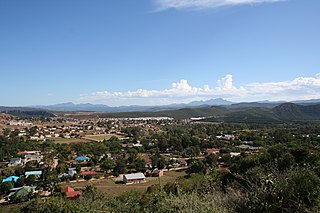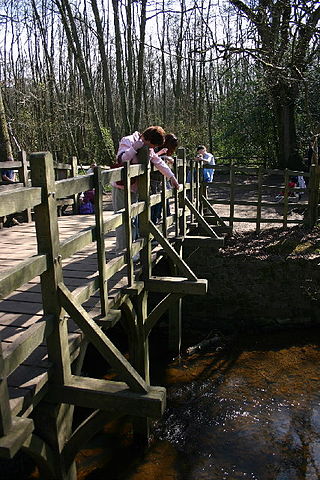Escheat is a common law doctrine that transfers the real property of a person who has died without heirs to the crown or state. It serves to ensure that property is not left in "limbo" without recognized ownership. It originally applied to a number of situations where a legal interest in land was destroyed by operation of law, so that the ownership of the land reverted to the immediately superior feudal lord.
This aims to be a complete list of the articles on real estate.
A deed, commonly, is a legal document that is signed and delivered, especially one regarding the ownership of property or legal rights. More specifically, in common law, a deed is any legal instrument in writing which passes, affirms or confirms an interest, right, or property and that is signed, attested, delivered, and in some jurisdictions, sealed. It is commonly associated with transferring (conveyancing) title to property. The deed has a greater presumption of validity and is less rebuttable than an instrument signed by the party to the deed. A deed can be unilateral or bilateral. Deeds include conveyances, commissions, licenses, patents, diplomas, and conditionally powers of attorney if executed as deeds. The deed is the modern descendant of the medieval charter, and delivery is thought to symbolically replace the ancient ceremony of livery of seisin.

In South Africa, the terms township and location usually refer to the often underdeveloped racially segregated urban areas that, from the late 19th century until the end of apartheid, were reserved for the non-whites, namely Black Africans, Coloureds and Indians. Townships were usually built on the periphery of towns and cities. The term township also has a distinct legal meaning in South Africa's system of land title, which carries no racial connotations.

Lord of the manor is a title that, in Anglo-Saxon England and Norman England, referred to the landholder of a rural estate. The titles date to the English feudal system. The lord enjoyed manorial rights as well as seignory, the right to grant or draw benefit from the estate. The title continues in modern England and Wales as a legally recognised form of property that can be held independently of its historical rights. It may belong entirely to one person or be a moiety shared with other people. The title is known as Breyr in Welsh.

In common law systems, land tenure, from the French verb "tenir" means "to hold", is the legal regime in which land "owned" by an individual is possessed by someone else who is said to "hold" the land, based on an agreement between both individuals. It determines who can use land, for how long and under what conditions. Tenure may be based both on official laws and policies, and on informal local customs. In other words, land tenure implies a system according to which land is held by an individual or the actual tiller of the land but this person does not have legal ownership. It determines the holder's rights and responsibilities in connection with their holding. The sovereign monarch, known in England as the Crown, held land in its own right. All land holders are either its tenants or sub-tenants. Tenure signifies a legal relationship between tenant and lord, arranging the duties and rights of tenant and lord in relationship to the land. Over history, many different forms of land tenure, i.e., ways of holding land, have been established.

Common land is land owned by a person or collectively by a number of persons, over which other persons have certain common rights, such as to allow their livestock to graze upon it, to collect wood, or to cut turf for fuel.
Torrens title is a land registration and land transfer system, in which a state creates and maintains a register of land holdings, which serves as the conclusive evidence of title of the person recorded on the register as the proprietor (owner), and of all other interests recorded on the register.

Recorder of deeds or deeds registry is a government office tasked with maintaining public records and documents, especially records relating to real estate ownership that provide persons other than the owner of a property with real rights over that property.
A profit, in the law of real property, is a nonpossessory interest in land similar to the better-known easement, which gives the holder the right to take natural resources such as petroleum, minerals, timber, and wild game from the land of another. Indeed, because of the necessity of allowing access to the land so that resources may be gathered, every profit contains an implied easement for the owner of the profit to enter the other party's land for the purpose of collecting the resources permitted by the profit.

An overlord in the English feudal system was a lord of a manor who had subinfeudated a particular manor, estate or fee, to a tenant. The tenant thenceforth owed to the overlord one of a variety of services, usually military service or serjeanty, depending on which form of tenure the estate was held under. The highest overlord of all, or lord paramount, was the monarch, who due to his ancestor William the Conqueror's personal conquest of the Kingdom of England, owned by inheritance from him all the land in England under allodial title and had no superior overlord, "holding from God and his sword", although certain monarchs, notably King John (1199–1216) purported to grant the Kingdom of England to Pope Innocent III, who would thus have become overlord to English monarchs.

The Land Registration Act 2002 is an Act of the Parliament of the United Kingdom which repealed and replaced previous legislation governing land registration, in particular the Land Registration Act 1925, which governed an earlier, though similar, system. The Act, together with the Land Registration Rules, regulates the role and practice of HM Land Registry.
Land registration is any of various systems by which matters concerning ownership, possession, or other rights in land are formally recorded to provide evidence of title, facilitate transactions, and prevent unlawful disposal. The information recorded and the protection provided by land registration varies widely by jurisdiction.
Australian property law, or property law in Australia, are laws that regulate and prioritise the rights, interests and responsibilities of individuals in relation to "things" (property). These things are forms of "property" or "rights" to possession or ownership of an object. Property law orders or prioritises rights and classifies property as either real and tangible, such as land, or intangible, such as the right of an author to their literary works or personal but tangible, such as a book or a pencil. The scope of what constitutes a thing capable of being classified as property and when an individual or body corporate gains priority of interest over a thing has in legal scholarship been heavily debated on a philosophical level.
Land councils, also known as Aboriginal land councils, or land and sea councils, are Australian community organisations, generally organised by region, that are commonly formed to represent the Indigenous Australians who occupied their particular region before the arrival of European settlers. They have historically advocated for recognition of traditional land rights, and also for the rights of Indigenous people in other areas such as equal wages and adequate housing. Land councils are self-supporting, and not funded by state or federal taxes.
The Ottoman Land Code of 1858 was the beginning of a systematic land reform programme during the Tanzimat (reform) period of the Ottoman Empire in the second half of the 19th century. This was followed by the 1873 land emancipation act.

South African property law regulates the "rights of people in or over certain objects or things." It is concerned, in other words, with a person's ability to undertake certain actions with certain kinds of objects in accordance with South African law. Among the formal functions of South African property law is the harmonisation of individual interests in property, the guarantee and protection of individual rights with respect to property, and the control of proprietary management relationships between persons, as well as their rights and obligations. The protective clause for property rights in the Constitution of South Africa stipulates those proprietary relationships which qualify for constitutional protection. The most important social function of property law in South Africa is to manage the competing interests of those who acquire property rights and interests. In recent times, restrictions on the use of and trade in private property have been on the rise.
Chinese property law has existed in various forms for centuries. After the Chinese Communist Revolution in 1949, most land is owned by collectivities or by the state; the Property Law of the People's Republic of China passed in 2007 codified property rights.
Indigenous land rights in Australia, also known as Aboriginal land rights in Australia, are the rights and interests in land of Aboriginal and Torres Strait Islander people in Australia; the term may also include the struggle for those rights. Connection to the land and waters is vital in Australian Aboriginal culture and to that of Torres Strait Islander people, and there has been a long battle to gain legal and moral recognition of ownership of the lands and waters occupied by the many peoples prior to colonisation of Australia starting in 1788, and the annexation of the Torres Strait Islands by the colony of Queensland in the 1870s.

Squatting in Namibia is the occupation of unused land or derelict buildings without the permission of the owner. European settlers arrived in the nineteenth century and acquired land, leaving only 38 per cent of land in indigenous hands by 1902. This led to squatting and the Herero Wars, which ended with the Herero and Namaqua genocide. After Namibian independence in 1990, squatting increased as people migrated to the cities and land reform became a goal for those who had participated in the liberation struggle. By 2020, 401,748 people were living in 113 informal settlements across the country. Squatting continues to be regulated by the Squatters Proclamation of 1985; a challenge to this law was dismissed by the High Court in 2023.






















